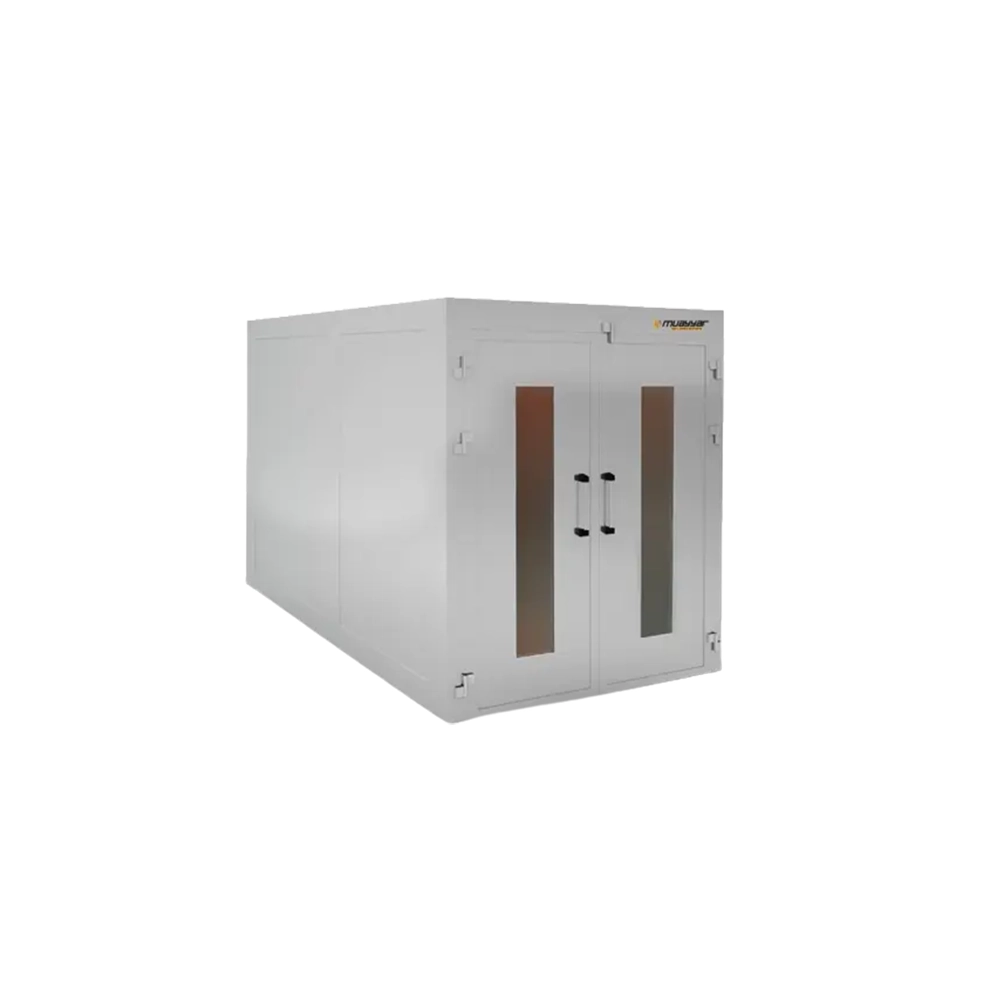Dough Fermentation Room
Technicial Specifications
| FERMENTATION CABINET | MDF 100 | MDF 200 |
| CAPACITY | 2 | 4 |
| CABINET THICKNESS MM | 60-80 | 60-80 |
| WIDTH MM | 1250 | 2000 |
| LENGTH MM | 2500 | 2500 |
| HEIGHT MM | 2000 | 2000 |
A dough fermentation room, also known as a proofing room or a fermentation chamber, is a specialized area in a bakery or food production facility designed for the fermentation process of dough. During fermentation, yeast or other leavening agents react with sugars in the dough, producing carbon dioxide gas, which causes the dough to rise and develop flavor and texture.
Components of a Dough Fermentation Room:
- Temperature and Humidity Control: These rooms are equipped with temperature and humidity control systems to create optimal conditions for yeast fermentation. Typically, temperatures range from 75°F to 95°F (24°C to 35°C), and humidity levels are maintained between 70% to 80%.
- Ventilation: Proper ventilation is essential to regulate airflow within the fermentation room, ensuring consistent temperature and humidity levels throughout.
- Racks or Shelves: Dough trays or racks are used to hold and store the dough during fermentation. These racks are often designed to maximize space utilization while allowing adequate airflow around the dough.
- Monitoring Systems: Advanced fermentation rooms may include monitoring systems to track temperature, humidity, and fermentation progress, ensuring consistent quality and allowing for adjustments as needed.
Importance of a Dough Fermentation Room:
- Optimized Fermentation: Controlled temperature and humidity levels in fermentation rooms create ideal conditions for yeast activity, resulting in consistent and predictable fermentation outcomes.
- Enhanced Flavor and Texture: Proper fermentation allows for the development of complex flavors and improved texture in baked goods, contributing to their overall quality.
- Increased Production Efficiency: Fermentation rooms facilitate bulk fermentation, allowing bakeries to produce large quantities of dough at once, streamlining production processes, and increasing efficiency.
- Extended Shelf Life: Dough fermentation contributes to the preservation of baked goods, extending their shelf life and maintaining freshness.
- Consistent Product Quality: With precise control over fermentation conditions, bakeries can achieve consistent quality in their products, meeting customer expectations and building brand reputation.
Dough fermentation rooms are used primarily for controlling the fermentation process of dough in bakeries and food production facilities. Here are several reasons why these rooms are essential:
- Optimal Fermentation Conditions: Fermentation rooms provide controlled environments with regulated temperature and humidity levels, creating ideal conditions for yeast or leavening agents to ferment the dough. This controlled environment ensures consistent and predictable fermentation outcomes.
- Improved Flavor Development: Proper fermentation allows for the development of complex flavors in the dough. Yeast fermentation produces byproducts such as alcohol and organic acids, contributing to the flavor profile of the baked goods.
- Enhanced Texture: During fermentation, gas bubbles produced by yeast activity cause the dough to rise, resulting in a light and airy texture in the finished product. Proper fermentation in dedicated rooms ensures uniform fermentation throughout the dough, leading to consistent texture in baked goods.
- Extended Shelf Life: Controlled fermentation helps in the development of dough structure, which contributes to the improved shelf life of baked goods. Properly fermented dough tends to have better moisture retention and texture, leading to longer-lasting products.
- Increased Production Efficiency: Fermentation rooms allow for bulk fermentation, enabling bakeries to ferment large quantities of dough simultaneously. This streamlines the production process, improves efficiency, and enables bakeries to meet demand more effectively.
- Consistent Product Quality: With precise control over fermentation conditions, bakeries can achieve consistent quality in their products. Uniform fermentation leads to consistent flavor, texture, and appearance in baked goods, contributing to customer satisfaction and brand reputation.
Overall, dough fermentation rooms play a critical role in ensuring optimal fermentation conditions, flavor development, texture improvement, extended shelf life, increased production efficiency, and consistent product quality in bakeries and food production facilities.


Reviews
There are no reviews yet.